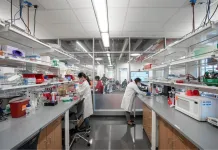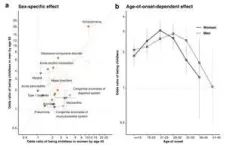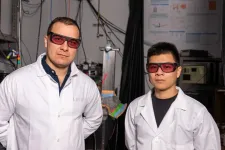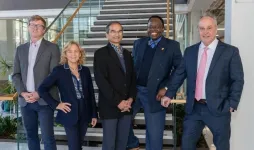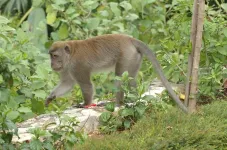(Press-News.org)
Funding an unconventional approach to fighting cancer that emphasizes the integration of diverse scientific disciplines, the U.S. Department of Defense has awarded $3.2 million to establish the Convergent Science Cancer Consortium (CSCC), led by Dean’s Professor of Biological Sciences Peter Kuhn at the USC Dornsife College of Letters, Arts and Sciences.
The consortium, which includes Stanford University, Cedars-Sinai Medical Center and Children’s Hospital Los Angeles as inaugural members, unites experts from fields such as biology, engineering, mathematics and computer science, to discover more effective treatment strategies through a more holistic understanding of cancer, particularly for hard-to-treat forms such as bladder cancer, sarcomas and metastatic cancers.
A global asset in finding cancer solutions
A leading cause of death worldwide, cancer presents complex challenges that often exceed the scope of traditional research methods. By fostering collaboration across various scientific domains, the CSCC intends to overcome these limitations. And because it will include scientists from across disciplines and institutions, their proposed solutions are likely to be more versatile and applicable to a diverse range of populations and health care systems.
“The CSCC is a paradigm shift in cancer research,” said Peter Kuhn, Dean’s Professor of Biological Sciences at USC Dornsife and director of the CSCC. A trained physicist and director of the Convergent Science Institute in Cancer at the USC Michelson Center for Convergent Bioscience, Kuhn brings a unique perspective and broader vision to cancer research.
“By integrating diverse scientific insights, we can develop more effective, tailored treatments for patients, especially those fighting intractable forms of cancer,” he said.
The CSCC places a special emphasis on understanding and addressing cancer in military personnel, a group often exposed to unique environmental risks such as asbestos in conflict zones.
This focus, relatively rare in cancer research, offers significant benefits not only to military personnel but also to civilians exposed to similar hazards. The insights gained could lead to better prevention and treatment strategies for cancers caused by specific environmental factors.
More personal, more effective cancer treatment
The consortium’s approach aims to advance personalized cancer treatments that consider individual patient profiles. This could result in more effective treatments with reduced side effects. They will also study technologies for real-time monitoring, such as wearable devices, that hold promise for early detection and intervention, potentially improving patient survival rates.
Co-principal investigator Dan Theodorescu is the director of Cedars-Sinai Cancer Center and a renowned physician scientist and cancer expert. Theodorescu combines molecular and cell biology with computational methods in his research. He and Kuhn have long held a belief that convergent science holds exceptional power to find cancer solutions.
Co-principal investigator Christina Curtis of Stanford University brings extensive biomedical data science expertise. Using the latest computational methods, she’ll lead efforts to parse the copious and varied information the consortium researchers will produce.
Co-investigator Fariba Navid of Children’s Hospital Los Angeles has expertise in pediatric bone and soft tissue sarcomas. She will continue an ongoing collaboration with Kuhn to assess circulating tumor cells in these cancers.
The establishment of the Convergent Science Cancer Consortium, much of which is modeled on the recently established Convergent Science Virtual Cancer Center led by Theodorescu as director and Kuhn as deputy director, marks a pivotal moment in cancer research, according to the researchers — one that “means new avenues of hope for patients and their families,” said Kuhn.
##
END
Results from a phase II clinical trial indicate that psilocybin, a hallucinogenic chemical found in certain mushrooms of the genus Psiloybe, may benefit individuals with cancer and major depression. Trial participants treated with psilocybin not only experienced a lessening of depressive symptoms but also spoke highly of the therapy when interviewed at the end of the trial. The findings are published by Wiley in two articles appearing online in CANCER, a peer-reviewed journal of the American Cancer Society.
By binding to a specific subtype of serotonin receptor in the brain, psilocybin can cause alterations to mood, ...
ANN ARBOR, Mich. – Among many parents’ top resolutions for the New Year: More patience, less time on phones, better consistency with discipline and healthier family habits.
Their tweens and teens are setting goals too – including achievements related to grades and school, success in an activity, exercise and nutrition and earning money, according to the University of Michigan Health C.S. Mott Children’s Hospital National Poll on Children’s Health.
Nearly three in four parents polled report making ...
In the week following any hospital visit for an overdose, only 1 in 18 people with opioid use disorder begin a treatment known to be highly effective in reducing illness and deaths, according to new research in CMAJ (Canadian Medical Association Journal) https://www.cmaj.ca/lookup/doi/10.1503/cmaj.231014.
“These results highlight critical missed opportunities to prevent future mortality and morbidity related to opioid use, despite connection to health care for many patients in the days after a toxicity event,” writes Dr. Tara Gomes, a researcher at ...
Experts today call for more value to be given to patients’ ‘lived experiences’ as a study of over 1,000 patients and clinicians found multiple examples of patient reports being under-valued.
The research, led by a team at the University of Cambridge and Kings’ College London, found that clinicians ranked patient self-assessments as least important in diagnostic decisions, and said that patients both over- and under-played their symptoms more often than patients reported doing so.
One patient shared the common feeling of being disbelieved ...
Embargoed for release: Friday, December 15, 6:30 PM ET
Key points:
Using national data between 1993 and 2021, researchers observed that India’s national prevalence of child marriage—defined by the study as marriage before age 18—declined throughout the study period.
The decade between 2006 and 2016 saw the largest magnitude of reduction in child marriage, while the years between 2016 and 2021 saw the smallest. During these latter years, six Indian states/union territories saw increases in the prevalence of girl child marriage and eight saw increases in boy child marriage.
The study is among the first to examine how the prevalence of child marriage ...
In a clinical trial of patients with chronic kidney disease, an experimental drug significantly reduced albuminuria — albumin in urine, a sign of kidney damage — for 50% of participants. When the experimental drug was paired with a standard-care medication, 70% of participants reportedly experienced a significant reduction in albuminuria.
The findings are published today in The Lancet. The paper’s lead author is Dr. Katherine Tuttle, a clinical professor of nephrology at the University of Washington School of Medicine and executive director for research at Providence ...
HOUSTON – (Dec. 15, 2023) – Materials with enhanced thermal conductivity are critical for the development of advanced devices to support applications in communications, clean energy and aerospace. But in order to engineer materials with this property, scientists need to understand how phonons, or quantum units of the vibration of atoms, behave in a particular substance.
“Phonons are quite important for studying new materials because they govern several material properties such as thermal conductivity and carrier properties,” said Fuyang Tay, a graduate student in applied physics working with the Rice ...
The National Science Foundation has awarded Lehigh University $6 million to increase the translation of scientific discoveries by faculty, graduate students and postdoctoral researchers into prototypes, products and programs that will benefit society.
The NSF’s Directorate for Technology Innovation and Partnerships (founded in 2022) provided the four-year award to an interdisciplinary, university-wide team led by John Coulter, senior associate dean for research in the P.C. Rossin College of Engineering and Applied Science, as part of the new federal Accelerating Research Translation (ART) program.
The award ...
Vinod Namboodiri, joint faculty member of Lehigh University’s College of Health and P.C. Rossin College of Engineering and Applied Science, has been awarded Phase 2 funding from the National Science Foundation’s (NSF) Convergence Accelerator to further develop a digital app to help persons with disabilities navigate indoor environments successfully.
MABLE: Mapping for Accessibility in BuiLt Environments provides persons with disabilities independence to experience large events, conferences and educational programs. Using crowdsensing, AI and robotics, MABLE empowers individuals with responsive ...
In a first-of-its-kind study for North America, scientists accumulated a list of potential invasive species for Florida, and researchers deemed 40 pose the greatest threat.
A team of experts, led by University of Florida scientists, evaluated terrestrial, aquatic and marine species with characteristics that make them particularly adept at invasion. Their list includes 460 vertebrates, invertebrates, algae and plants.
“Invasive species management tends to be reactive, instead of preventative,” said Deah Lieurance, ...
